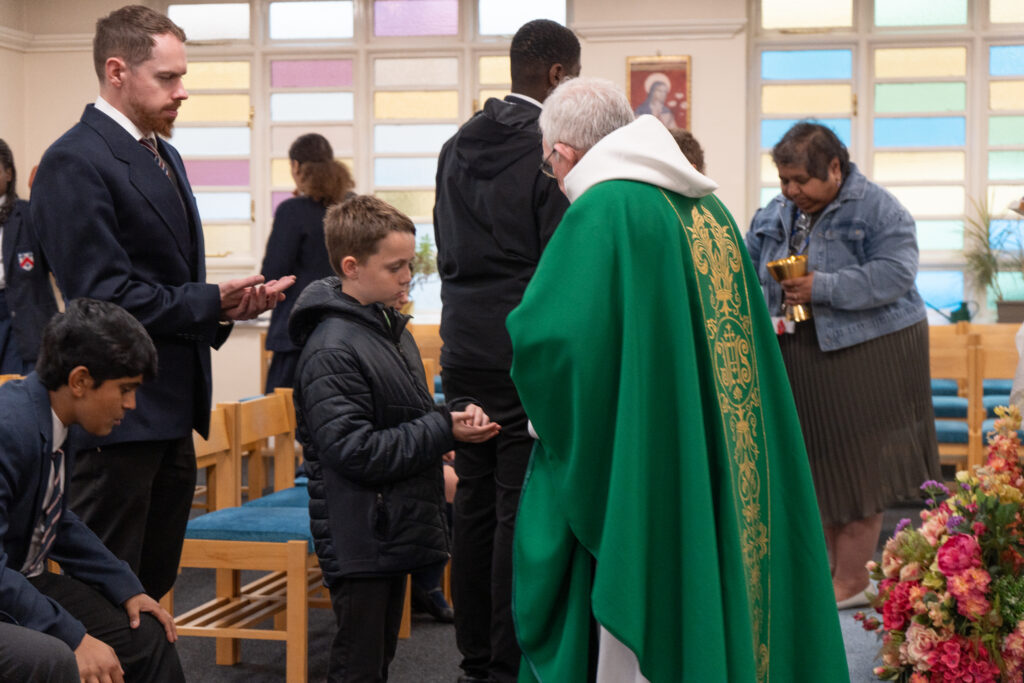Christ At The Centre
Founded in 1976, Trinity Catholic High School is one of the most distinguished Catholic schools in the country.
In partnership with parents, Trinity aims through a Christ-centred curriculum, to develop young men and women of faith, good character, strong intellect and generous spirit, able to move confidently into the world and to use their talents and gifts to lead and serve others.
The School is part of the Catholic Church, and, as such, is conducted in full accordance with the Canon Law and the teachings of the Church. Religious Education, in particular, is in accordance with the rites, practices, discipline and liturgical norms of the Catholic Church, and at all times the School serves as a witness to the Catholic faith.

Jesus Christ is “the way, the truth and the life”. Those who profess this faith believe that in Christ the truth about Almighty God and the truth about the human person is revealed.
The unfolding of this truth constitutes the Church’s teaching. The acceptance of this truth brings true freedom and the fullness of life. Proclaiming this truth, this Gospel (Good News), by making Christ known to all peoples, constitutes the mission of the Church.
The first key reason why Catholic schools are established, then, is to be part of the Church’s mission in education, to place Christ and the teaching of the Catholic Church at the centre of people’s lives. “Education is integral to the mission of the Church to proclaim the Good News. First and foremost every Catholic educational institution is a place to encounter the living God who in Jesus Christ reveals his transforming love and truth.”
This evangelising mission is exercised through the diverse interaction of Catholic schools with their local parishes, families, societies and cultures they serve.
To put Christ and the teachings of the Catholic Church at the centre of the educational enterprise is the key purpose of Catholic schools. In a Catholic school, the Church seeks to build the foundation of our spiritual development, our learning and teaching, the formation of culture and our society in Christ. The fullness of life is to be found when Christ is at the centre of our lives. The Church has therefore “…in a special way the duty and the right of educating, for it has a divine mission of helping all to arrive at the fullness of Christian life”.
By placing Christ at the centre of all that they are and all that they do, Catholic schools have the potential to promote the “fullness of Christian life” through an “…educational philosophy in which faith, culture and life are brought into harmony.”
This means that the Church provides Catholic schools to be more than just places where pupils are equipped with learning and skills for the workplace and responsible citizenship. Rather, they are to be the communities where the spiritual, cultural and personal worlds within which we live are harmonised to form the roots from which grow our values, motivation, aspirations and the moral imperatives that inform our choices and actions as persons.
It is with good reason therefore that Pope Benedict XVI described Catholic schools as “an essential resource for the new evangelization.”

Compassion – Vocation – Wisdom
St. Augustine was Bishop of Hippo in North Africa. He is also one of the greatest thinkers in Christian history as well as secular philosophy. Before he converted to Catholicism, Augustine proved to be a colourful character with an equally colourful history. A brilliant student, Augustine revelled in university life. He definitely ate and drank as if there was no tomorrow! He had relationships with different women and actually fathered a child out of wedlock. Augustine keenly understood human weakness!
During his studies after his conversion, Augustine deeply reflected on the Compassion and Wisdom of God whose Vocation was to save man and so bring about a new creation. Augustine eventually concentrated on the profound doctrine of the Trinity, that there are Three Persons in one God. Augustine suggested a brilliant explanation of this divine mystery. He argued as follows:
- God is pure spirit of unlimited compassion. God sees himself as one would see a reflection but, because the reflection is pure spirit it actually is another person, His Beloved Son.
- The Father looks at this Image and the Image or Son looks at the Father like an adoring father or mother would regard their beloved son who returns that love just as deeply. The love between Father and Son is the Holy Spirit or, as they say in the Eastern churches, the Holy Wisdom.
- From the beginning God wanted to manifest His Wisdom, His Compassion and His Vocation by creating a new being, the human, fashioned or made in God’s image.
- Because we are the image of God, all human beings share three great attributes with the Divine: Vocation, Compassion and Wisdom. To underpin and exercise these three attributes, free will must be exercised, a gift only human beings share with God.
- At the beginning of time, this Human Image lived perfectly in harmony with themselves, with their environment and with their God. This harmony was shattered by a great revolt against God which led to the Fall and the emergence of evil in human affairs. Nevertheless God, full of compassion and wisdom, kept faith with the divine vocation to create and maintain human beings made in his image. God directly intervened through his Beloved Son as Clement of Alexandra wrote “The Image of god became a man so Man could become God.”
- This vocation, Jesus Christ, became flesh. God’s only son became human to show us the way back to God. Indeed, in the very early church, shortly after the Resurrection of Christ, the Christian faith was simply known as “The Way;” the Way back to God, to becoming truly human.

At Trinity we share that same belief. We are all a part of God’s creation. We have a vocation to follow and we must develop the wisdom to help achieve excellence in all we do as well as show God’s compassion to others.
- At Trinity we believe that, through the Eucharist, our Vocation is to love God, be compassionate to our neighbour and grow in wisdom, this is the path of excellence.
- At Trinity we believe that religion lies as the heart of every individual’s vocation. We must be compassionate and wise to all. We must value other people’s religious beliefs and their practice of them.
- At Trinity we believe that our vocation is to serve. According to Christ, those who follow this vocation should be accorded a special dignity and respect. We must have the wisdom to realise that all who serve the students act as their parents, their mothers and their fathers.
- At Trinity we believe that our vocation is to build and develop a community which is compassionate and dedicated to the pursuit of excellence in all aspects.
- At Trinity we believe that the fabric of the school and all its resources are for our enjoyment. We must take great care of these.
- At Trinity we believe that our vocation is to become more compassionate and deepen our wisdom. In doing so, we can better serve others, both in our own communities and those communities attached to it, be it our neighbourhood, our country or those communities in the world which require our compassion.
- At Trinity we believe that our vocation must always protect and show great compassion to those weaker than us, this is the wisdom of God made flesh in Jesus Christ.
- At Trinity we believe we are here to make our parents and families proud.
- At Trinity we believe that what we do, what we achieve is important in this life and in the life to come where compassion, vocation and wisdom reach their fulfilment.
- Our Vision is summed up in this Acclamation.
“May the Father of our Lord Jesus Christ
Enlighten the eyes of our mind,
So that we can clearly see
What hope God holds for us.
Alleluia.”


